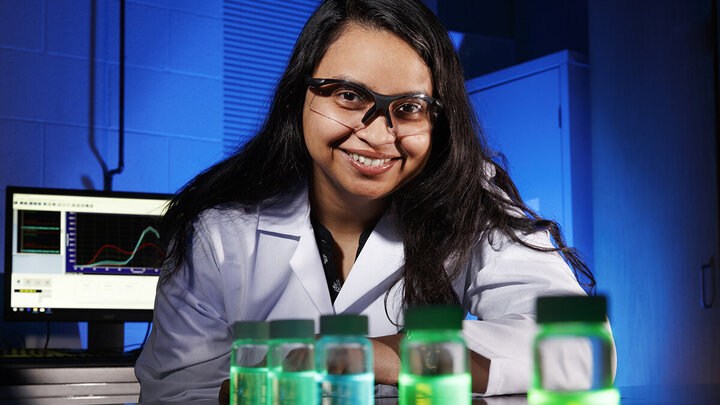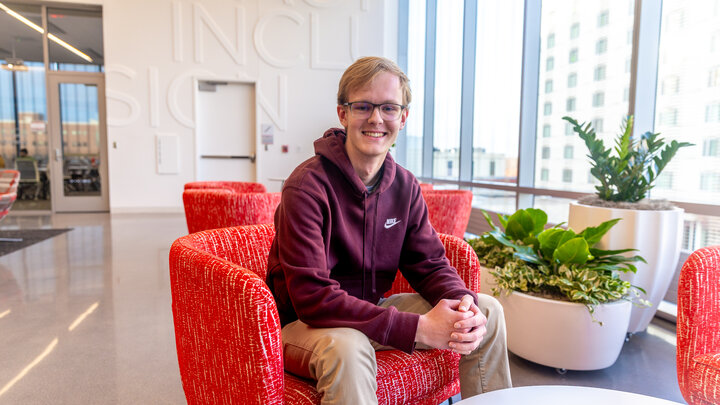In the past seven months, the Department of Chemical and Biomolecular Engineering has been awarded seven federal grants totaling nearly $5 million.
According to College of Engineering Dean Lance C. Pérez, the results of these projects will positively impact the state for generations via the important research that is performed and the talent that is created - boosting the viability of Nebraska’s agriculture and energy sectors and expanding economic opportunities for those who live and work in the state.
The most recent faculty hired into the department - Vitaly Alexandrov, Mona Bavarian, Shudipto Dishari, Siamak Nejati and Rajib Saha – have been honored with National Science Foundation (NSF) CAREER awards, the most prestigious award new faculty can receive.
“Research conducted in the Department of Chemical and Biomolecular Engineering impacts Nebraska in many ways,” said Hossein Noureddini, department chair. “Our projects have grown substantially in the last five years, with support from federal agencies such as NSF, the Department of Energy and the National Institutes of Health, including a highly competitive MIRA (R35) award that demonstrates UNL is among the best universities in the country. We also receive funding from the Nebraska Ethanol Board and Nebraska Environmental Trust.”
Hossein noted that UNL has the only chemical engineering program in the state.
“As such, we provide the workforce for many manufacturing facilities, including 24 ethanol plants. We’re a big agriculture state, and companies like Cargill, ADM and High Plains all need chemical engineers to develop and improve technologies and processes that safely and efficiently feed the country. The work we’re doing, educating future engineers and conducting research, is critical to the Nebraska bioeconomy,” he said.
Recent grants awarded to department faculty include:
- A $1.032 million grant to Saha, Richard L. and Carol S. McNeel Associate Professor of Chemical and Biomolecular Engineering, from NSF that will evaluate the role of a molecule (melanin) for use as a biologically produced replacement for costly synthetic compounds used for ultraviolet light protection products and advanced materials. This project, which includes collaborators at Iowa State University, can have a direct impact on the Nebraska bioeconomy.
- A three-year $1,298,502 grant to Ravi Saraf, Lowell E. and Betty Anderson Distinguished Professor of Chemical and Biomolecular Engineering, from NIH to develop a system that quantifies and characterizes disease and physiological stress using samples from very small amounts of biological material. This technology already has a commercialization partner and could see application in diagnostics for human medicine and animal health, areas of significant economic growth potential in Nebraska.
- A $283,480 NSF award to Alexandrov, Richard L. McNeel Associate Professor of Chemical and Biomolecular Engineering, to study the role of minute variations in material structures on electronic material stability, research that can improve technologies for power transmission, battery storage and solar energy.
- Notification of funding for Dishari, Ross McCollum Associate Professor of Chemical and Biomolecular Engineering for a $600,000 grant from NSF aimed at designing membranes that have more precise control of the movement of charged molecules.
- Associate Professor Wei Niu’s partnership in an NSF-sponsored project led by Harvard University to engineer microorganisms using waste CO2 and metal electrodes to sustain the development of biomaterials. Nebraska’s ethanol industry generates substantial amounts of CO2 that can be readily captured and reallocated into beneficial uses, like bio-based products in support of the Nebraska bioeconomy.
- A $1.5 million project to improve water treatment filtration systems is led by Associate Professor Siamak Nejati, Assistant Professor Mona Bavarian, and Bruce Dvorak, Ray Fauss Professor of Civil and Environmental Engineering. The Nebraska team is working with researchers at Kansas State University, Oklahoma State University and Seward County Community College in Kansas on a three-year grant from NSF and the Established Program to Stimulate Competitive Research (EPSCoR). They are creating cleaner and greener solutions to reduce unwanted materials on solid surfaces in water systems and then repurpose that waste into value added products, which could be utilized directly in Nebraska agricultural operations.
“Research within the Department of Chemical and Biomolecular Engineering and other units in the College of Engineering illustrate our efforts to support the state’s economy,” said Pérez. “Their discoveries and inventions elevate Nebraska’s economic capabilities through increasing domestic bio-product production, promoting energy independence, increasing additional revenue opportunities for farmers and ranchers, and safeguarding state and national resources.”




